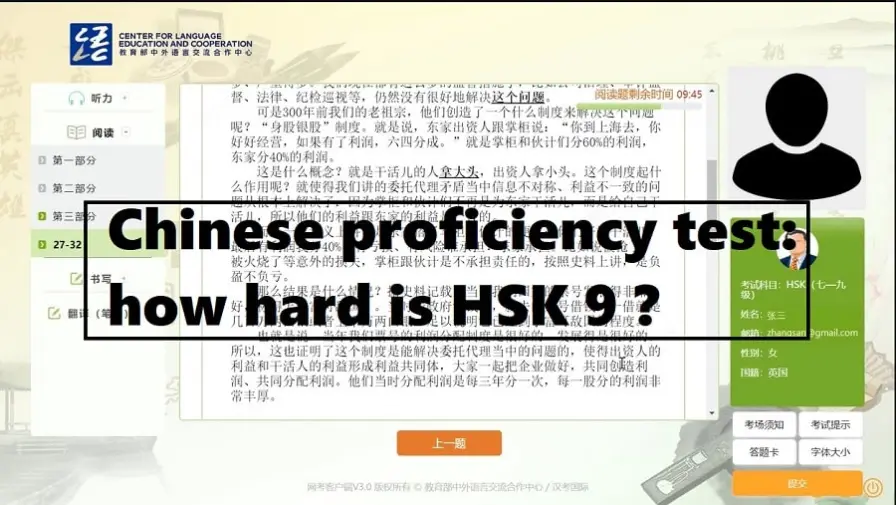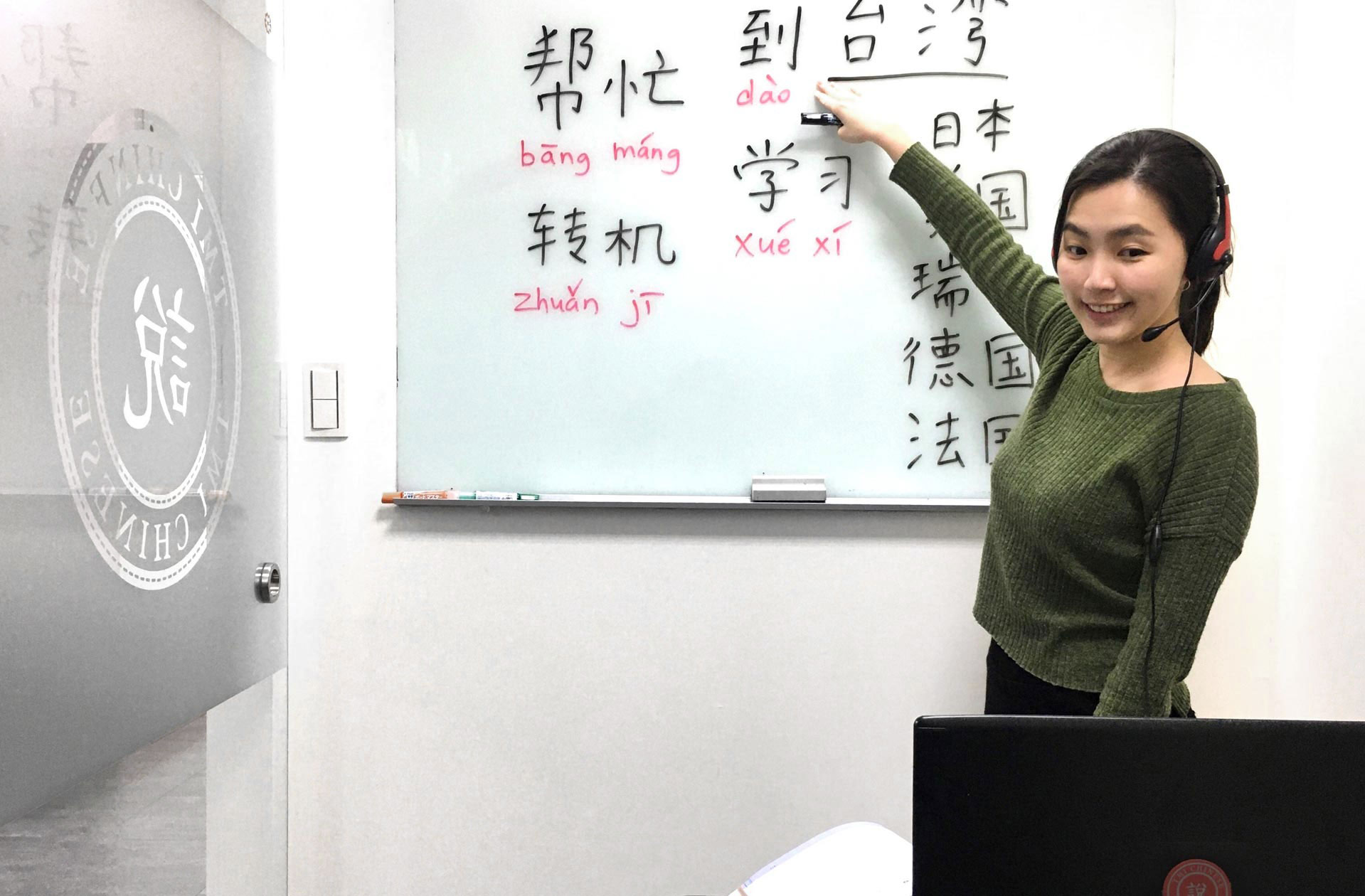In 2020, the introduction of three new HSK levels shocked the global Chinese learning community. Where HSK 6 used to be the ultimate certification of Chinese language skills, now you can aim all the way for HSK 9. But how difficult is HSK 9 and what to expect in each part of the exam?
The new HSK levels 7 – 9
The new HSK didn’t simply fall out of the air, nor did the HSK superminds (Hanban) feel that the previous system didn’t challenge Chinese learners enough so that they had to come up with something truly impossible.
No, the main purpose of the so-called HSK 3.0 is to provide a language test for advanced Chinese learners who seek to study or work at a Chinese university, not least those who major in Chinese language and literature and those who study in China for their master’s and doctoral degrees. In other words, we’re mainly talking about sinologists, graduate and post-graduate students applying for a Chinese university program.
Unlike “HSK 7 – 9” suggests it’s actually one exam, you get graded 7, 8 or 9 depending on your score.
Some people might feel they already know enough at this point and want to stop reading. That’s okay. Below I’ll take a more detailed look at each part of the exam.
Language proficiency test to enter German university
I remember taking a similar test before starting my master’s degree in Germany. Applicants had to provide proof that their knowledge of German is sufficient to study at a German university. Back then, I had been studying German for three years pretty much full-time (my bachelor’s degree was German studies), so I didn’t have any difficulties passing the infamous “DSH-Prüfung”. It tested listening, reading, writing and speaking on a more or less academic level.
Main difficulties
The HSK 7 – 9 exam is not that different, although it contains some peculiar parts that are new. Disclaimer: I didn’t take the HSK 7 – 9 exam (yet). All the following is based on information from people who did. I summarized their experience, which should give you a rough picture what to expect and to prepare for.

Everyone familiar with climbing the HSK exam ladder knows that with each new level the bar is being raised: the amount of vocabulary increases, listening, reading and writing exercises become longer and more complex. HSK 9 is no exception to this rule. Candidates face a large pool of advanced and more formal vocabulary, a broad variety of topics they’re probably not familiar with. Some examples from recent exams include winter sports, business negotiations, literature, marine life, historical architecture. The difficulty level is significantly higher than HSK 6 and time, as always, is limited.
01. Listening

Like in all HSK exams listening comes first. What makes a listening comprehension test hard? I can think of the following things and HSK 9 features them all:
- Speaking speed is high (I can’t remember this being the case with the HSK exams I took. On the contrary, speakers would speak slow and clearly with enough time between questions)
- High information density (the more complex and formal the language, the more information can be transported)
- Very little context, no warming-up or any kind of introduction (no time for the brain to adapt to the topic)
- No repetition of key information & vocabulary (you have to get it instantly, no second chances)
- Hardly any information or hints can be derived from the questions (“read the questions first” used to be the best advise for the listening part)
All these factors make targeted listening next to impossible. Obviously, you can’t extract the details needed to answer the questions if you’re still struggling to determine the main subject. Unless your brain has been trained to this high level input, it simply needs more time to process what is being said. This is remarkable, since the HSK listening section used to be – if not the “easiest” part – at least that part where most candidates would achieve a reasonable score.
02. Reading

The HSK 9 reading section comes second and covers a wide range of topics. The text length beats anything seen before in HSK. We couldn’t be further away from HSK-4-style texts that you can skim through quickly, identifying the key information in a matter of seconds. Texts include classical and formal Chinese, so not only do you need to familiarize yourself with tons of vocabulary and complex sentence structures, but also with different kinds of texts that possibly refer to Chinese history and literature. Mere textbook Chinese is of little avail here. It’s hard to say what to prepare for exactly. It boils down to this: if you haven’t read your share during your years of study, you’ll be in trouble.
Apart from the overall complexity, the biggest opponent (again) is time. You got 60 minutes to finish 47 questions. Without previous exam training it’s (almost) impossible to distribute that time wisely.
03. Writing

The third section is writing. It consists of two assignments, amounting to 800 words of output that has to be produced in 55 minutes. The first task is to describe and analyze charts with information. The second task is to write a short essay.
What gives the writing part a new quality is that neither of the items involve any retelling or summarizing of a given text. In other words, it’s pure output (and you can’t use ChatGPT or other tools^^). What’s more, at this level you’re not supposed to use 口语 or spoken language, but rather formal language, fit for academia. It’s also not enough to simply produce a 600 word text. The essay should present your arguments in a logical and structured way. This is a typical skill Chinese learners acquire by practicing formal writing.
At this point, we’re 90 minutes into the exam and focus is probably decreasing. On the positive side, if you’re taking the online exam, you can use the keyboard to produce Chinese characters instead of handwriting. To me that’s almost a difference between night and day.
04. Translation

The fourth part of the test is something new: translation. The texts that are to be translated are provided in five languages, which are English, Korean, Japanese, Thai, and Vietnamese. You’ve already picked your language as you registered for the exam. The first item is written and the second is spoken.
The written part contains a short text in your preferred language which should be translated (back) into Chinese. Here you can expect to be tested on certain sentence patterns, grammar points and vocabulary that the HSK test creators have laid out for you, so it’s tricky. Even more so for those who are not native in their preferred language. For the spoken part you have to play the interpreter and do a live translation. You get one minute to read another short text and two minutes to translate.
Maybe the main difficulty here is that it’s hard to know what to prepare for exactly. Actually, you can’t prepare anything. You have to process the provided input and reproduce it in Chinese in a matter of minutes. Translation – although related to listening, reading, writing and speaking – is a skill on its own which requires special training. Possibly at this stage of your learning, you have tons of translation experience and don’t encounter any problems. On the other hand, if non of the five languages mentioned above is your native tongue, the translation part can be nasty and it doesn’t feel entirely fair.
05. Oral test

With the final translation task you’ve already entered the oral test and there are only 25 minutes left. Previously (HSK 1 – 6), the HSK oral test wasn’t a mandatory part of the HSK exam. For HSK 7 – 9 however, you have to take the oral test.
Now you can expect something like reading a table with information and than answering a question, using this information to solve a problem. In other words, you have to extract the key information fast and provide a sensible answer. For the second part you have to listen and answer questions. Finally, you have to react to a given topic or thesis with three minutes time to prepare your answer.
Here once more, you hardly get any time to think over your answers. You have to listen, not knowing what questions you’re going to be asked and then when the beep comes you give it your best shot. The only thing you can prepare is a handful of useful sentence patterns to structure your answers.
Conclusion – how hard is HSK 9?
From everything I’ve seen so far, HSK 7 – 9 is without doubt the most difficult HSK exam ever. In terms of scale, complexity and time pressure it beats every other HSK exam. You literally have to be a trained sinologist to stand any chance. On the positive side, if you don’t plan to study or perform research at a Chinese university, you probably don’t ever have to worry about taking this exam.
Want to judge for yourself? Have a look at the only mock exams for HSK 7 – 9 that are currently (February 2023) available:
- Listening, reading, writing, translation: HSK 7-9 模拟考试 | HSK 7-9 Official Mock Test | 汉语水平考试七—九级全球首考
- Translation & oral test: HSK 7-9 模拟考试(口试,口译语言:英语)| HSK 7-9 Official Mock Test Oral Exam | 汉语水平考试七—九级全球首考




